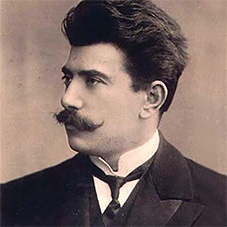
Bio
Reinhold Glière (born1874, Kiev - died 1956, Moscow) was a Soviet composer, of German and Polish descent, who was noted for his works incorporating elements of the folk music of several eastern Soviet republics. Glière was the son of a musician and maker of wind instruments. He attended the Moscow Conservatory—where he studied violin, composition, and music theory with notable composers as Sergey Taneyev and Mikhail Ippolitov-Ivanov and graduated in 1900. Glière achieved a high status in the Soviet musical world after the Russian Revolution, largely because of his interest in national styles. He organized workers’ concerts and directed committees of the Moscow Union of Composers and Union of Soviet Composers. At the end of the 20th century, Glière’s music was principally performed in countries formerly of the Soviet Union. Although Glière was highly respected by many, his often politically motivated works were criticized by others for lack of depth and originality. Nevertheless, his influence on younger Soviet composers was profound. Among his pupils were Sergey Prokofiev, Nikolay Myaskovsky, and Aram Khachaturian.
 Contact
Contact Basket
Basket My favorites
My favorites My account
My account






